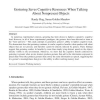Free Online Productivity Tools
i2Speak
i2Symbol
i2OCR
iTex2Img
iWeb2Print
iWeb2Shot
i2Type
iPdf2Split
iPdf2Merge
i2Bopomofo
i2Arabic
i2Style
i2Image
i2PDF
iLatex2Rtf
Sci2ools
106
click to vote
COGSCI
2010
2010
Gesturing Saves Cognitive Resources When Talking About Nonpresent Objects
In numerous experimental contexts, gesturing has been shown to lighten a speaker's cognitive load. However, in all of these experimental paradigms, the gestures have been directed to items in the ``here-and-now.'' This study attempts to generalize gesture's ability to lighten cognitive load. We demonstrate here that gesturing continues to confer cognitive benefits when speakers talk about objects that are not present, and therefore cannot be directly indexed by gesture. These findings that gesturing confers its benefits by more than simply tying abstract speech to the objects directly visible in the environment. Moreover, we show that the cognitive benefit conferred by gesturing is greater when novice learners produce gestures that add to the information expressed in speech than when they produce gestures that convey the same information as speech, suggesting that it is gesture's meaningfulness that gives it the ability to affect working memory load.
Cognitive Load | COGSCI 2010 | Gestures | Gesturing |
| Added | 09 Dec 2010 |
| Updated | 09 Dec 2010 |
| Type | Journal |
| Year | 2010 |
| Where | COGSCI |
| Authors | Raedy Ping, Susan Goldin-Meadow |
Comments (0)

